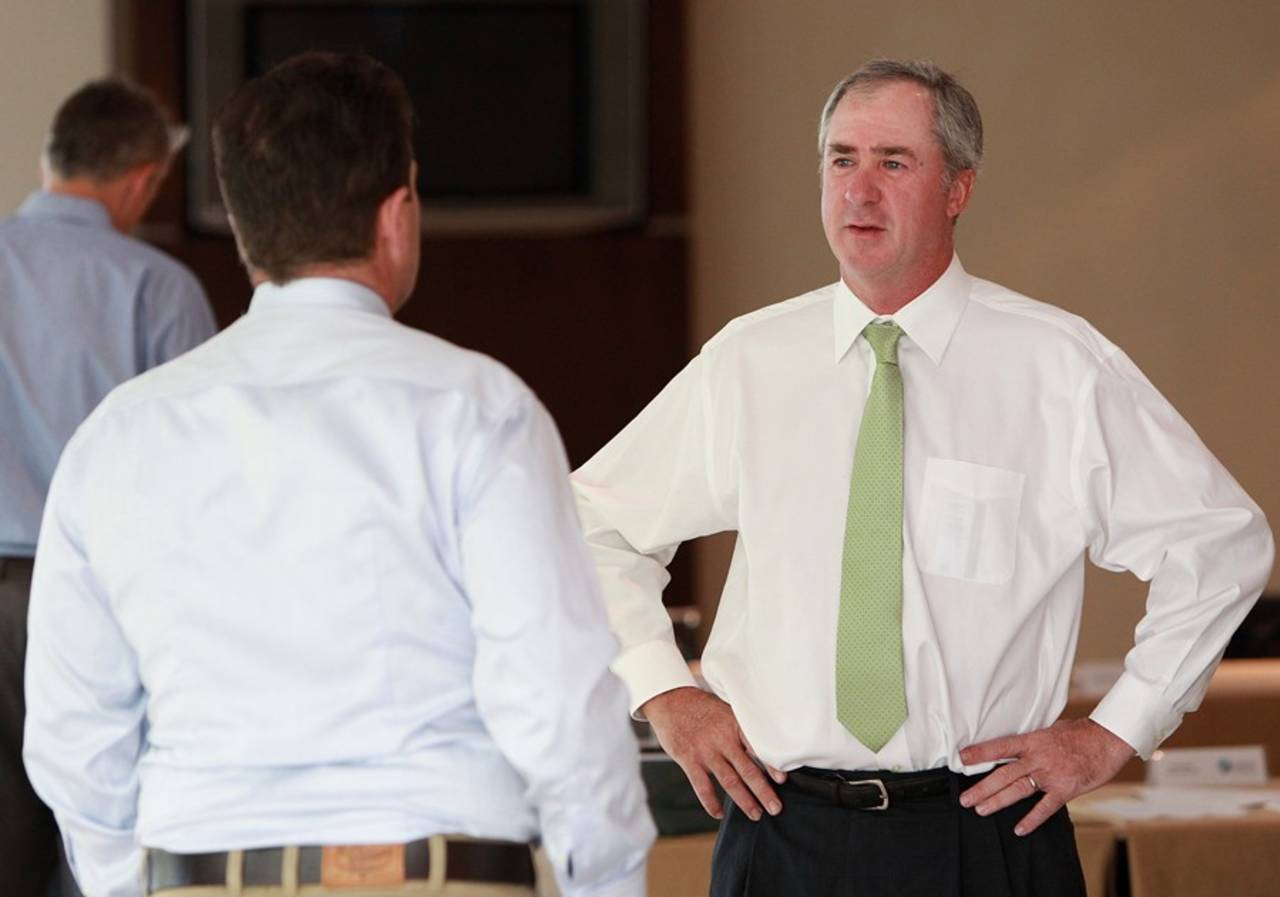A voice of dissent walks away
Tim May's resignation means parochialism and self-interest can now flourish in the ICC old boys' club without any impediment
Paul Ford
09-Jun-2013

Tim May's departure is a blow to transparency • Getty Images
"The game's in decay, and a large part of that has to be attributable to the top management, the governors of our sports, who seem to think they are above all rules that seem to apply to everyone else."
- Tim May, June 2013
- Tim May, June 2013
It was also sad to see him walk away not because his work was done but because he was tired of repeatedly ramming his dark curls against the brick wall of fish-head administrators' intransigence.
These words made for particularly grim reading: "Cricket increasingly seems to be pushing aside the principles of transparency, accountability, independence and upholding the best interests of the global game, in favour of a system that appears to operate through threats, intimidation and backroom deals."
Here May is bluntly referencing the raft of issues that have erupted around the game on the field, in nearby hotel rooms, local police stations and international cricket voting ballots.
May has been the key figure in the increased involvement of players in the way cricket is run around the world, and has fearlessly provided his constituents with a voice on the game's important issues - a perspective that has historically been absent, marginalised or ignored completely.
With a FICA badge on his tail-end batting helmet, he has waded into all sorts of issues across the spectrum, including player payments, the BCCI's corrosive influence, corruption slurs, the relentless meaninglessness of the international schedule's grind, tour safety, and the way the sport is governed.
Tim May is a massive fan of the Woolf report, the investigation into the way the ICC is run that emerged from the keyboards of jurist Lord Harry Woolf and risk expert Richard Sykes more than a year ago, and now growing cobwebs in the basement of the ICC head office in Dubai.
The report said a lot of things in its 60 pages, but these 21 words remain etched in my mind: "The game is too big and globally important to permit continuation of Full Member Boards using the ICC as a club."
Yet a club is exactly what it remains today. Since the report's damning indictment on the way the game is structured and its smorgasbord of recommended changes, exactly nothing has changed.
Talk of governance often invokes an effect in cricket fans similar to that produced by Valium, but when it's shambolic and the people in charge are making decisions to suit their own backyards rather than the good of the wider game, it impacts every fan and every player.
Tim May got that.
But FICA's cajoling for some action off the back of the Woolf report, even alongside some of the smaller cricketing nations, is not enough to be the catalyst for change at the ICC. The established power base of Full Members, or at least a subset of them, need to agitate too. Of course, turkeys don't vote for Christmas.
There is a New Zealand angle on this too.
A duo of Kiwis sits on the ICC board - accountants Chris Moller and Alan Isaac. Both are a part of the club's steering committee of head honchos, and have remained deathly silent in the wake of the Woolf Report and the recent voting "inconsistencies" that emerged around May's appointment to and dis-appointment from the ICC cricket committee. Heads down, thumbs down.
As two highly regarded businessmen in New Zealand, it is surprising neither has dared to voice a concern with the way things are run at the ICC at the moment, even as New Zealand Cricket stumbles through a governance revamp in its own backyard.
These are two blokes with stellar reputations and who most definitely know right from wrong, so we can only hope that behind the scenes they are agitating for change, and not sitting on their hands to preserve "power structures", "revenue streams" and "stakeholder relationships".
The price of doing nothing and accepting clubbiness, with all its backroom politicking, side deals and trade-offs, is already graffitied large on the next Kiwi cricket summer. The tour to God's Own by MSD and the Indian team is in the process of being rolled, bowled and rissoled despite the Future Tours Programme theoretically being set in stone. Chalk up another win to self-interest and parochialism.
Cricket has lost a tenacious advocate for transparency and change this week, and undoubtedly the game is weaker without May involved. He will be missed.
Paul Ford is a co-founder of the Beige Brigade. He tweets here